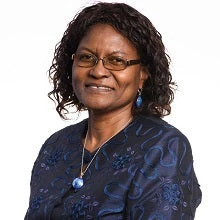 Photo: Sarah Farhat/ World Bank
Photo: Sarah Farhat/ World Bank
As we mark International Women’s Day this week, it’s a pivotal time to reflect on the journeys, achievements, and impact of women around the world and how we can speed up progress on gender equality. The World Bank Group’s financing and advice are behind many of these stories, and I am proud of the unique opportunity we have as an institution to influence development outcomes for women in significant ways.
Through their Group Travel Program, the World Bank Group’s Board of Executive Directors visits countries with operations we support, including those focused on gender equality, to see these efforts firsthand and engage in critical dialogue with those on the ground. Over the last year, this program has facilitated board members’ trips to several countries in Latin America and the Caribbean, East Asia and the Pacific, West and Central Africa, and the Middle East and North Africa. Exchanges with women leaders and beneficiaries of World Bank Group projects during these trips have enabled board members to gain critical insights into the scope and impact of our efforts to tackle poverty and gender inequality worldwide. I have also had the opportunity to join some of these trips in my capacity as Vice President and World Bank Group Corporate Secretary.
From São Tomé to Panama, the experiences of women who have taken part in World Bank-supported initiatives demonstrate that while the hurdles obstructing progress towards gender equality are common and transcend geographical borders, they are not insurmountable. I am encouraged by the testimonies of women entrepreneurs and beneficiaries of economic inclusion programs there, whose lives have changed for the better.
On a recent trip to East Asia, we met with the Qarasarau Women’s Club members in Fiji, who are part of the World Bank-funded Jobs for Nature (JFN2) initiative. Through this initiative, women are receiving skills training in solid waste sorting, auditing, and recycling, and have been able to produce creative handicrafts for sale. JFN2 has had many positive impacts, including a cleaner environment due to routine waste collection, an enhanced sense of togetherness, and increased independence as the women contribute towards their household incomes.
These stories have reinforced for me the critical importance of women’s economic empowerment to achieving the mission of ending extreme poverty and boosting prosperity on a livable planet. They also illustrate the significance of these projects in supporting our institution’s authorizing environment and affirm the assertion that gender equality is smart economics.
I have seen this fact manifest with impressive results throughout my career here. For example, in Bangladesh the implementation of many innovative programs addressing financial inclusion, family planning, and microfinance contributed to declining fertility rates from 6.1 births per woman in 1971 to 2.05 births in 2019, which bodes well for long-term health and productivity outcomes.
Policy reform in the South Caucasus fueled a commitment to tackle discrimination against women and saw an increase in female life expectancy in Armenia to almost 80 years old; higher numbers of Georgian girls and women attaining tertiary education, completing 15 years of education on average; and a rise in women’s labor force participation in Azerbaijan.
Burundi revamped its health care system over a decade ago and witnessed significant improvements in prenatal care and a decline in the maternal mortality rate from 555 deaths per 100,000 live births in 2013 to 479 deaths in 2019. Support to smallholders and small- and medium-size enterprises in the Bagre Growth Pole Project in Burkina Faso created jobs for more than 10,000 women.
These are just a few of the numerous success stories for women around the world.
But more than just beneficiaries of these successes, women are also dynamic agents of change who help shape the landscape of a more equal world. They bring unique perspectives, experiences, and solutions to the table. When we empower women and ensure their equal participation in decision-making processes, the world’s social, economic, and environmental challenges are addressed more effectively.
While we have made significant progress on this front, there is still much more work to do. Taking stock of global advancements towards gender equality reminds us of female leaders who have championed this cause and helped pave the road so many of us walk today: Ellen Johnson Sirleaf, Wangari Maathai, Mary Robinson, and many others. Their legacy is now ours to continue and each of us has a vital part to play.
This International Women’s Day, let us examine our individual roles in building up the next generation of women and reframe our thinking around gender equality not just as a development and economic priority, but as a personal priority too. The actions we take in our day-to-day lives have great potential to foster a more equitable and inclusive society alongside our impact at the institutional level.
Each of us is a catalyst for change. By leveraging our life experiences, knowledge, and expertise through service, advocacy, and mentorship, we can help cultivate the next generation of female leaders, innovators, and problem-solvers. Together, we can create a world where every woman has the chance to thrive.
Related:
More and better jobs: Unlocking the potential of South Asia’s women



Join the Conversation